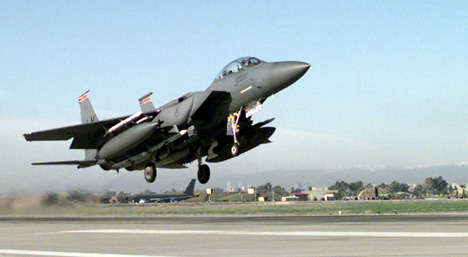Moscow presses Ankara for access to US Incirlik airbase
Moscow presses Ankara for access to US Incirlik airbase –

(The Australian) – Russia is pressing Turkey for access to a key airbase used by the US as it tries to extend its influence in the Middle East.
The American-built Incirlik base, about 65 miles from the Syrian border, is used by Nato and has about 50 US tactical nuclear warheads stored on site. A senior Russian politician said that allowing Russian jets and bombers to use it would be a “logical continuation” of President Erdogan’s efforts to rebuild Turkey’s relations with the Kremlin.
“It just remains to come to an agreement with Erdogan that we get the Nato base Incirlik as [our] primary airbase,” Senator Igor Morozov, a member of the upper house’s committee on international affairs, said. This would allow the Russian air force to subject Islamic State and other jihadist groups to “constant bombing” and bring the war to a quicker conclusion, he said.
“You’ll see, the next base will be Incirlik,” he told Izvestia, a Moscow daily, after the Kremlin revealed this week that its bombers had started using a base in Iran to launch attacks in Syria. “This will be one more victory for Putin.”
Viktor Ozerov, another senator, told the RIA Novosti state news agency: “It’s not certain that Russia needs Incirlik, but such a decision would be seen as a real willingness on Turkey’s part to co-operate with Russia in the war against terrorism in Syria.”
The development will rattle the West and could point to the most fundamental shift in Turkey’s relations with its Nato allies since the start of the Cold War. Incirlik, in Adana province, is used by US warplanes flying sorties against Isis and is home to the Pentagon’s 39th Air Base Wing. It is a crucial part of America’s ability to project its military might across the region. Turkey and Russia have backed opposing sides in Syria since the beginning of the civil war in 2011, with the Kremlin supporting President Assad with troops and air power and Mr Erdogan’s government seeking to bolster both the armed and political opposition. Their reconciliation is part of a wider foreign policy shift in Ankara which suggests that Mr Erdogan is trying to disentangle himself from the conflicts in the Middle East.
Russia’s bombing campaign in Syria, which has largely targeted civilians and anti-Isis rebels, has horrified the international community. Images were posted online yesterday of a traumatised five-year-old boy, bloodied and covered in dust, in a state of shock after an air strike in Aleppo — thought to have been carried out by a Russian jet.
US officials said that if Russia kept to its promise to seek a ceasefire in Syria consideration would be given to engaging in joint missions against Isis in Syria, but it seems unlikely that such co-operation would include missions from Incirlik.
The base was opened in 1954 and has been jointly run by Turkish and US forces ever since. At least 3,000 American troops are stationed there.
Turkey retains the right to exercise restrictions on the US’s use of Incirlik, including the number of aircraft stationed there and the type of missions they are used for. It approved US bombing sorties against Isis in July last year, but only after months of diplomatic wrangling. The US now flies F16 fighter jets, B52 bombers and A10 warthogs from the base.
Relations between Turkey and the US, Nato allies since 1955, have been sorely tested by recent events. The Ankara government is steadfastly opposed to US support for the Syrian-Kurdish militia the YPG, which has close links to the PKK, the group that is fighting a bloody insurgency against Turkish security forces on home soil.
Anti-American sentiment has spread through Turkey since the failed coup last month, with the government blaming a caucus within the military that is loyal to Fethullah Gulen, the Islamist preacher who has lived in Pennsylvania since 1999. The US has shown no sign that it is willing to extradite him to Turkey.
In a series of increasingly bullish speeches to crowds waving anti-US placards, Mr Erdogan has proclaimed that the US needs to choose between Mr Gulen and its relationship with Turkey.
By contrast, Ankara’s troubled relationship with Russia has been warming since June, when Mr Erdogan sent a letter to President Putin asking that he “excuse” him for the shooting down of a Russian fighter jet last November.
Mr Putin was one of the first world leaders to offer his support for Mr Erdogan after the failed coup. The two met in St Petersburg on August 9; two days later, Turkey announced that it had agreed to co-operate with the Russians against Isis in Syria.
Anthony Franks, a security consultant, said that the Incirlik overtures from the Kremlin appeared to be a test for Mr Erdogan. “This looks like Russia dipping its toe in the water to see what Turkey’s reaction might be,” he said.
